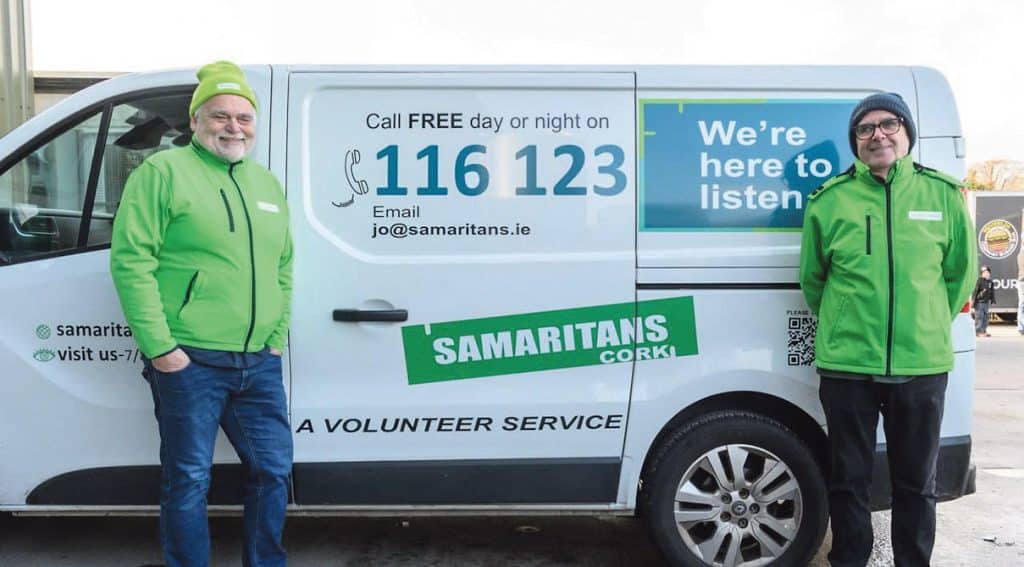
The Clonakilty branch of Samaritans is urging compassionate individuals from across West Cork to join its growing team of over 40 dedicated volunteers. Since opening its doors in 2023, this vital community resource has been handling approximately 400 calls a month, providing critical emotional support to those in need.
Clonakilty is one of 16 Samaritans branches across Ireland, all contributing to the organisation’s freephone helpline (116 123) and email support services, available 24 hours a day, 365 days a year. Nationally, Samaritans handles over 400,000 calls annually with the help of 1,500 volunteers in Ireland and an additional 500 in Northern Ireland.
While many associate the helpline with individuals in suicidal crisis, the reality is much broader. Over a third of calls come from people experiencing loneliness, and 40 per cent relate to mental health issues ranging from everyday stress and anxiety to diagnosed conditions. Other common concerns include relationship struggles, addiction, abuse, family problems, and financial worries.
“Some people call just because they need someone to talk to,” explains Jon Spencer, Branch Director at Cork Samaritans. “It might be the first time they’ve shared what’s on their mind. We hear from people of all ages and walks of life. Sometimes, they just need someone who will listen — someone who won’t judge or rush them to find solutions. That’s what we do best: provide space for people to talk and feel heard.”
Jon, a retired criminologist living in Rosscarbery, who has been a volunteer since 2015 and Cork branch director for the past two years, highlights the impact of volunteering. “Volunteering with Samaritans changes lives— not just for the people who call us, but for our volunteers too. It’s an incredibly meaningful experience to help someone through their darkest moments.”
Lisa Buckley, a Cork native now living in Union Hall, became a Samaritan volunteer after hearing a radio interview while living in Dublin. “It struck me how the phone just never stops ringing,” she recalls. “There’s such a need for us volunteers. And really, it’s such a simple and powerful thing that you can give, which is just your time.”
After moving to West Cork during the pandemic, Lisa joined the Cork branch, where she now handles PR as well as volunteering. She emphasises the confidentiality and integrity of the service. “None of the roles are paid; it’s a completely voluntary service run by a small group of people. There is real credibility to it, which is something that really appealed to me.”
Lisa describes the training as transformative. “The training is unbelievable. It’s actually something everyone should do because it teaches you skills you can bring into all aspects of your life. Volunteering has made me much more of an active listener, and I’ve become more broad-minded and empathetic. You realise that you never really know what’s going on in people’s inner world.”
Lisa volunteers for a four-hour shift once a week and a late shift once a month. She says the experience is deeply rewarding, not only because of the difference it makes for callers but also because of the support volunteers receive. “You’re never on your own as a volunteer. There’s always a co-volunteer with you on shift, and after every shift, you check in with a day leader to talk through your calls. If you’ve had a tough call, you can process it then and there, so you’re not bringing it home with you.”
Lisa also highlights the ongoing nature of training and the supportive community within Samaritans. “There are experienced listeners you can turn to at any time. And the group itself is amazing — so many interesting people with incredible life stories. It’s definitely not a depressing thing to do. On the contrary, it’s uplifting to be part of such a well-organised and compassionate team.”
The Clonakilty branch, like all Samaritans branches, also engages in outreach activities, including delivering talks in schools and workplaces, attending local events, and running the Listener Scheme in Cork Prison. These efforts ensure that Samaritans can reach people wherever they are, offering help in many forms.
Jon believes the Clonakilty branch has become a vital part of the community and sees tremendous potential for it to grow. “This branch is a testament to what we can achieve when people come together with a shared purpose. But to keep going, we need more people to join us. Even a few hours a week can make a huge difference.”
Lisa agrees and encourages anyone considering volunteering to take the step. “You’re not trying to fix somebody. You’re simply being with them and giving them space to talk through what’s on their mind. Sometimes, that’s all someone needs to feel a little lighter. It’s such a privilege to be part of that moment.”
If you’re interested in becoming a Samaritans volunteer, full training and ongoing support are provided. To find out more or to contact the Samaritans, visit their website or call the helpline at 116 123.
And if you need someone to talk to, remember, Samaritans are here to listen — day or night, no judgment, no pressure.
Kate’s story
“I’ve had a wonderful life in many ways. And a lot to be grateful for – education, a family and friends that love me, a roof over my head, and food in my belly. Having all these things made it hard for me to accept that I was not feeling ok. I always felt like I would come across as ungrateful, so I would keep everything to myself, and let it spread like mould.
I have struggled with anxiety since I was very young. I got bullied a bit in school, and online, when that became a thing. I wasn’t a straight A student whatsoever, I was just trying to get by. University was so difficult for me at times. Between the laughs and conversations, I would seclude myself and act like everything was fine. I constantly walked in the shadow of what people would think of me – what if they found out what was actually going on in my head?
Around that time, I had some really negative experiences in my life, with men, and I had some life-changing moments. Shortly after is when I first experienced the unnerving feeling that I didn’t want to be here anymore. These thoughts consumed my day-to-day life; my favourite songs became a funeral playlist, my short sleeves became long ones, and my appetite began to fade away. Everyday, it felt like I had lead blocks on my feet and I just wanted some sort of relief. My brain told me my loved ones would be better off without me. Some part of me wanted to die.”
I still remember the day I took the right step, and I phoned Samaritans. Sitting on the bathroom floor, as I phoned the number, my brain was going 100 miles an hour, wondering what if – what if someone knows I called? What if I’m overreacting? What if I’m crazy?
But that call to Samaritans was my first step to getting better. I felt like I had lost myself, I was in a crisis and I just needed someone to talk to, I didn’t want to burden anyone. Talking to a Samaritan, I didn’t feel like I was a burden when I shared my thoughts and whatever was festering inside my head. At that moment, I felt like I wasn’t alone anymore, even if I was on the phone on the bathroom floor.
Samaritans do something amazing by being there for anyone in crisis or feeling down. Nowadays, we’re all under so much pressure and we’re so disconnected from each other, in a world that is all online. That’s why Samaritans’ work is so important – they help those who are struggling to feel less alone in this big world.
I’m so happy I reached out for help. Things changed after that; I started going to therapy, I tried medications and found one that works for me. And, the most difficult thing for me, I began telling my friends and family when I was struggling and needed help.”



